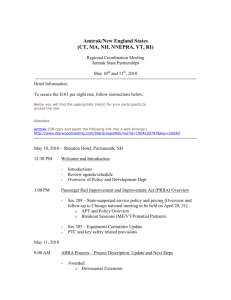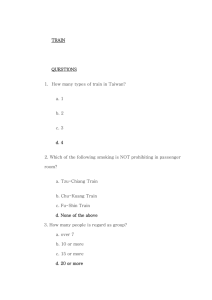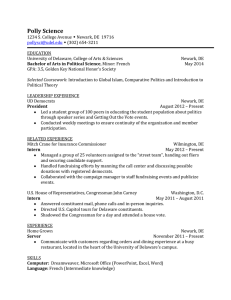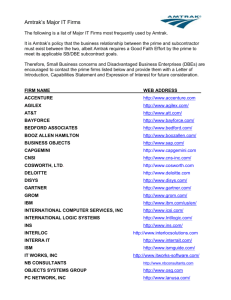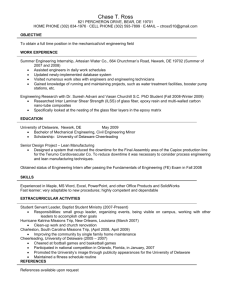Document 10682851
advertisement
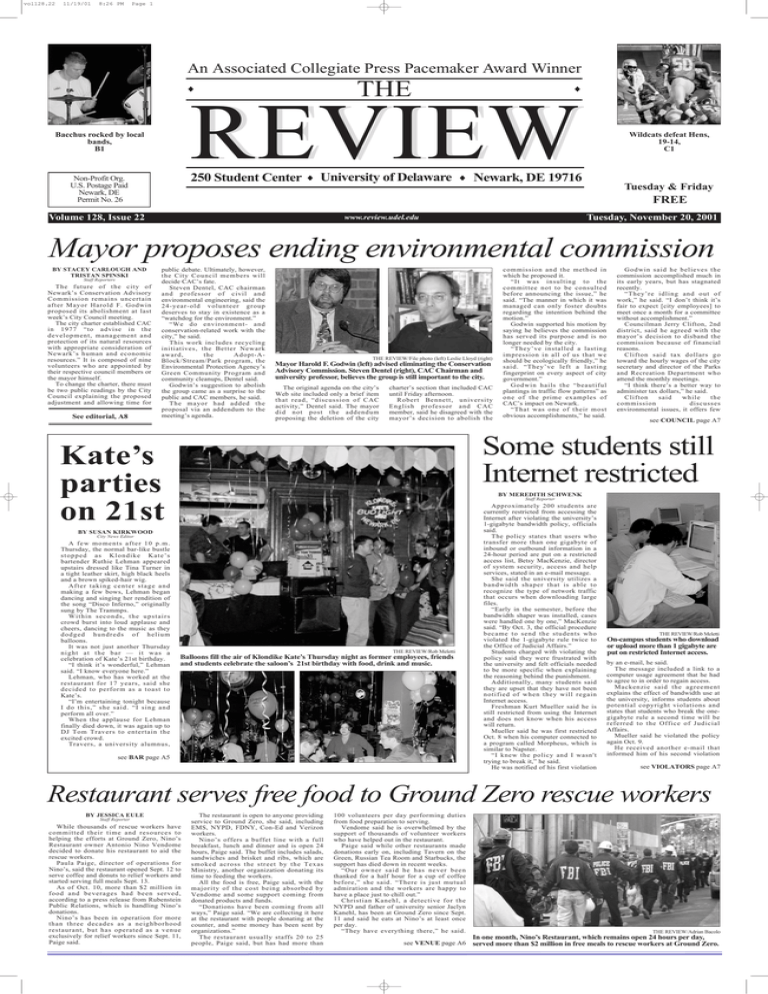
vol128.22 11/19/01 8:26 PM Page 1 An Associated Collegiate Press Pacemaker Award Winner THE ♦ ♦ REVIEW Bacchus rocked by local bands, B1 250 Student Center ♦ University of Delaware Non-Profit Org. U.S. Postage Paid Newark, DE Permit No. 26 ♦ Wildcats defeat Hens, 19-14, C1 Newark, DE 19716 Tuesday & Friday FREE Volume 128, Issue 22 Tuesday, November 20, 2001 www.review.udel.edu Mayor proposes ending environmental commission BY STACEY CARLOUGH AND TRISTAN SPINSKI Staff Reporters The future of the city of Newark’s Conservation Advisory Commission remains uncertain after Mayor Harold F. Godwin proposed its abolishment at last week’s City Council meeting. The city charter established CAC in 1977 “to advise in the development, management and protection of its natural resources with appropriate consideration of Newark’s human and economic resources.” It is composed of nine volunteers who are appointed by their respective council members or the mayor himself. To change the charter, there must be two public readings by the City Council explaining the proposed adjustment and allowing time for See editorial, A8 public debate. Ultimately, however, the City Council members will decide CAC’s fate. Steven Dentel, CAC chairman and professor of civil and environmental engineering, said the 24-year-old volunteer group deserves to stay in existence as a “watchdog for the environment.” “We do environment- and conservation-related work with the city,” he said. This work includes recycling initiatives, the Better Newark award, the Adopt-ABlock/Stream/Park program, the Environmental Protection Agency’s Green Community Program and community cleanups, Dentel said. Godwin’s suggestion to abolish the group came as a surprise to the public and CAC members, he said. The mayor had added the proposal via an addendum to the meeting’s agenda. THE REVIEW/File photo (left) Leslie Lloyd (right) Mayor Harold F. Godwin (left) advised eliminating the Conservation Advisory Commission. Steven Dentel (right), CAC Chairman and university professor, believes the group is still important to the city. The original agenda on the city’s Web site included only a brief item that read, “discussion of CAC activity,” Dentel said. The mayor did not post the addendum proposing the deletion of the city charter’s section that included CAC until Friday afternoon. Robert Bennett, university English professor and CAC member, said he disagreed with the mayor’s decision to abolish the Godwin said he believes the commission accomplished much in its early years, but has stagnated recently. “They’re idling and out of work,” he said. “I don’t think it’s fair to expect [city employees] to meet once a month for a committee without accomplishment.” Councilman Jerry Clifton, 2nd district, said he agreed with the mayor’s decision to disband the commission because of financial reasons. Clifton said tax dollars go toward the hourly wages of the city secretary and director of the Parks and Recreation Department who attend the monthly meetings. “I think there’s a better way to administer tax dollars,” he said. Clifton said while the commission discusses environmental issues, it offers few see COUNCIL page A7 Some students still Internet restricted Kate’s parties on 21st BY MEREDITH SCHWENK Staff Reporter BY SUSAN KIRKWOOD City News Editor A few moments after 10 p.m. Thursday, the normal bar-like bustle stopped as Klondike Kate’s bartender Ruthie Lehman appeared upstairs dressed like Tina Turner in a tight leather skirt, high black heels and a brown spiked-hair wig. After taking center stage and making a few bows, Lehman began dancing and singing her rendition of the song “Disco Inferno,” originally sung by The Trammps. Within seconds, the upstairs crowd burst into loud applause and cheers, dancing to the music as they dodged hundreds of helium balloons. It was not just another Thursday night at the bar — it was a celebration of Kate’s 21st birthday. “I think it’s wonderful,” Lehman said. “I know everyone here.” Lehman, who has worked at the restaurant for 17 years, said she decided to perform as a toast to Kate’s. “I’m entertaining tonight because I do this,” she said. “I sing and perform all over.” When the applause for Lehman finally died down, it was again up to DJ Tom Travers to entertain the excited crowd. Travers, a university alumnus, commission and the method in which he proposed it. “It was insulting to the committee not to be consulted before announcing the issue,” he said. “The manner in which it was managed can only foster doubts regarding the intention behind the motion.” Godwin supported his motion by saying he believes the commission has served its purpose and is no longer needed by the city. “They’ve installed a lasting impression in all of us that we should be ecologically friendly,” he said. “They’ve left a lasting fingerprint on every aspect of city government.” Godwin hails the “beautiful plantings in traffic flow patterns” as one of the prime examples of CAC’s impact on Newark. “That was one of their most obvious accomplishments,” he said. THE REVIEW/Rob Meletti Balloons fill the air of Klondike Kate’s Thursday night as former employees, friends and students celebrate the saloon’s 21st birthday with food, drink and music. see BAR page A5 Approximately 200 students are currently restricted from accessing the Internet after violating the university’s 1-gigabyte bandwidth policy, officials said. The policy states that users who transfer more than one gigabyte of inbound or outbound information in a 24-hour period are put on a restricted access list, Betsy MacKenzie, director of system security, access and help services, stated in an e-mail message. She said the university utilizes a bandwidth shaper that is able to recognize the type of network traffic that occurs when downloading large files. “Early in the semester, before the bandwidth shaper was installed, cases were handled one by one,” MacKenzie said. “By Oct. 3, the official procedure became to send the students who violated the 1-gigabyte rule twice to the Office of Judicial Affairs.” Students charged with violating the policy said they were frustrated with the university and felt officials needed to be more specific when explaining the reasoning behind the punishment. Additionally, many students said they are upset that they have not been notified of when they will regain Internet access. Freshman Kurt Mueller said he is still restricted from using the Internet and does not know when his access will return. Mueller said he was first restricted Oct. 8 when his computer connected to a program called Morpheus, which is similar to Napster. “I knew the policy and I wasn't trying to break it,” he said. He was notified of his first violation THE REVIEW/Rob Meletti On-campus students who download or upload more than 1 gigabyte are put on restricted Internet access. by an e-mail, he said. The message included a link to a computer usage agreement that he had to agree to in order to regain access. Mackenzie said the agreement explains the effect of bandwidth use at the university, informs students about potential copyright violations and states that students who break the onegigabyte rule a second time will be referred to the Office of Judicial Affairs. Mueller said he violated the policy again Oct. 9. He received another e-mail that informed him of his second violation see VIOLATORS page A7 Restaurant serves free food to Ground Zero rescue workers BY JESSICA EULE Staff Reporter While thousands of rescue workers have committed their time and resources to helping the efforts at Ground Zero, Nino’s Restaurant owner Antonio Nino Vendome decided to donate his restaurant to aid the rescue workers. Paula Paige, director of operations for Nino’s, said the restaurant opened Sept. 12 to serve coffee and donuts to relief workers and started serving full meals Sept. 13. As of Oct. 10, more than $2 million in food and beverages had been served, according to a press release from Rubenstein Public Relations, which is handling Nino’s donations. Nino’s has been in operation for more than three decades as a neighborhood restaurant, but has operated as a venue exclusively for relief workers since Sept. 11, Paige said. The restaurant is open to anyone providing service to Ground Zero, she said, including EMS, NYPD, FDNY, Con-Ed and Verizon workers. Nino’s offers a buffet line with a full breakfast, lunch and dinner and is open 24 hours, Paige said. The buffet includes salads, sandwiches and brisket and ribs, which are smoked across the street by the Texas Ministry, another organization donating its time to feeding the workers. All the food is free, Paige said, with the majority of the cost being absorbed by Vendome and some support coming from donated products and funds. “Donations have been coming from all ways,” Paige said. “We are collecting it here at the restaurant with people donating at the counter, and some money has been sent by organizations.” The restaurant usually staffs 20 to 25 people, Paige said, but has had more than 100 volunteers per day performing duties from food preparation to serving. Vendome said he is overwhelmed by the support of thousands of volunteer workers who have helped out in the restaurant. Paige said while other restaurants made donations early on, including Tavern on the Green, Russian Tea Room and Starbucks, the support has died down in recent weeks. “Our owner said he has never been thanked for a half hour for a cup of coffee before,” she said. “There is just mutual admiration and the workers are happy to have a place just to chill out.” Christian Kanehl, a detective for the NYPD and father of university senior Jaclyn Kanehl, has been at Ground Zero since Sept. 11 and said he eats at Nino’s at least once per day. “They have everything there,” he said. THE REVIEW/Adrian Bacolo In one month, Nino’s Restaurant, which remains open 24 hours per day, see VENUE page A6 served more than $2 million in free meals to rescue workers at Ground Zero. vol128.22 11/19/01 8:26 PM Page 3 November 20, 2001 ■ THE REVIEW ■ A3 Council must submit plan to revamp Amtrak BY TOM MONAGHAN Staff Reporter The Amtrak Reform Council reported its findings to Congress and provided recommendations for the restructuring of the passenger rail system at a meeting Wednesday, officials said. The ARC, an independent federal commission created by Congress under the Amtrak Reform and Accountability Act of 1997, has been examining Amtrak with the intent of offering a plan for corporate restructuring and a focus on self-sufficiency. According to the act, the ARC has to produce a restructuring plan within 90 days of reporting its findings. Scott Leonard, spokesman for the National Association of Railroad Passengers, said he hopes Congress will not act on the recommendations. “At the end of 90 days, we would like to see Congress disregard the report,” he said. Another contingency of the 1997 law requires that Amtrak must produce a plan for its own liquidation for submission with the ARC recommendations. The liquidation, Leonard said, would involve the complete stripping down of the system. If Amtrak is liquidated, it would have the greatest impact on states in the Northeastern See editorial, A8 “The message that we are getting from the federal government is the less we spend on passenger rail the better.” THE REVIEW/File photo The Amtrak Reform Council reported to Congress Wednesday its evaluation of the rail service and its potential for restructuring and self-sufficiency. corridor, he said. “There are a lot of smaller places that Amtrak goes that don’t have other transportation options,” Leonard said. “The states in the Northeast could band together to duplicate the service, but they would have to use their own money and agree on a plan.” Amtrak officials released a statement calling the ARC’s actions “the wrong decision at the wrong time,” but refused to comment further. Those same sentiments were echoed by Sen. Thomas R. Carper, D-Del., who said he feels ARC “made the wrong decision at the worst time.” Brian Selander, spokesman for Carper, said the senator considers Amtrak part of the “steel resolve” of the country’s transportation system and is currently working to ensure Amtrak continues to provide service. UD soil institute helps farmers with research Group gathers 26 tons of food BY SHARI ABRAMSON Staff Reporter BY KATE GOREY Staff Reporter The fourth annual “Stuff the Bus” Thanksgiving food drive took place at five different locations throughout Delaware last week, raising nearly 26 tons of food, said Lisa Carlisle, volunteer coordinator for the Food Bank of Delaware. Sponsored by DART First State and the Food Bank of Delaware, “Stuff the Bus” is a program in which buses are parked throughout Delaware, allowing people wishing to donate food to come pack it on the buses, Carlisle said. “We collected about 25 tons last year, so it is a little better this year,” she said. The food collected will be distributed to more than 200 member agencies throughout the state, Carlisle said. Member agencies are other non-profit organizations and churches, which operate safe and nutritious food programs for those with limited incomes, she said. “We deal with these agencies year round,” Carlisle said. “We will probably put the food into meal boxes and distribute them.” Patty Boyd, marketing specialist for THE REVIEW/Laura Smalley DART’s “Stuff the Bus” Thanksgiving food drive raised approximately 26 tons of food by parking buses throughout the state to collect donations. DART, said she thought the turnout this year was great. “We want people to know that this is a statewide event,” she said. Boyd said she thinks it is a good idea that the buses are set up in different locations because it makes it easier for people throughout the state to participate. Organizers of the event said they hope it will grow even larger every year. “The schools and the companies that have been with us from the start of the program have continued to show their support,” Boyd said. Julie Theyers, assistant marketing manager for DART, said radio stations WJBR and Eagle 97 helped promote the event. Both organizations plan to continue running the event annually, Theyers said. “The food drive is a good idea and it has worked for us so far, so we will continue to sponsor it,” she said. Carlisle said the event accepts any support. “Some companies donate money instead of food, which we don’t promote,” she said. “But we will take what we get and use it toward the food drive. “My analogy is this — you can donate your food, time and money.” BY APRIL R. SMITH Reach for the sky Senior Staff Reporter THE REVIEW / Michele Balfantz was something he wanted to try. “I was definitely scared the first time I went, but I loved it,” he said. “I went back that same afternoon and did my second jump. “It’s hard to describe it –– it’s just something you have to experience for yourself. It’s like floating on a big column of air.” Freedman said he had to complete an accelerated free-fall program and other skydiving courses before he could obtain his skydiving license. He said training procedures help prepare people for their jumps and make skydiving a safer sport than The university will receive $120,000 in federal funding to help establish the Institute of Soil and Environmental Quality. Brian Selander, communication director for Sen. Thomas R. Carper, D-Del., said the university will acquire this money through the fiscal year 2002 Agriculture Appropriations Bill, which was announced Wednesday. Selander said Delaware’s Congressional Delegation secured the money for agricultural research to help the state’s farmers find solutions to environmental and soil quality issues. He said one way to better the environmental quality in the state is to improve scientific knowledge and research capabilities. “The University of Delaware is already the leader in so many fields,” he said. “This money helps ensure that it stays in the ranks of the top research institutes in soil and environmental quality in the country.” Selander said the most important goal is improving the state’s agricultural industry and environment. “The Institute of Soil and Environmental Quality is a step toward that goal, along with the $290,000 secured for the Claude E. Phillips Herbarium at Delaware State University,” he said. Selander said Delaware farmers have many problems that these research institutes can help solve. They can also help the future of the state’s agricultural industry and environmental quality, he said. Lisa Borin, legislative assistant for Sen. Joseph R. Biden Jr., D-Del., said the research done at the institute will be disseminated throughout the country. “We’re very excited to have this bill passed since we have been trying for over two years to get this money,” she said. “This bill is not only exciting for the state of Delaware but for the entire country as well. “There are no disadvantages to this bill.” Borin said one of the projects the institute will focus on is non-point surface pollution of surface waters due to excess nutrients, such as nitrites, in the ground. “This issue has come up time and time again and the soil institute would help in solving this difficult problem,” she said. “If we are going to sustain agricultural productivity, we need to reduce this pollution.” She said the state also has problems with excessive phosphorous levels caused by poultry production and its impact on area local waterways. “The research done at this institute will bring together animal scientists, soil scientists, hydrologists and environmental engineers to try and tackle these problems along with the general drought issues in agriculture,” she said. Elizabeth Brealy Wenk, spokeswoman for Rep. Michael N. Castle, R-Del., said Castle worked with Carper and Biden to secure the funding. “There is a large agricultural community in the state, especially in southern Delaware, and it plays a huge role,” she said. Brealy Wenk said there is a nutrient imbalance in the ground and harmful substances such as sewage have tainted the water. “We wanted to bring an institute together under one organization and we thought, what better place to have this than at UD.” she said. “We need to know how to deal with these problems.” Selander said the bill still needs to be signed by President George W. Bush before the university will receive the $120,000. “I don’t know when UD will get the money, but the bill is almost certain to pass,” he said. Seniors learn computer basics In the Spotlight ADAM FREEDMAN When sophomore Adam Freedman took a job packing parachutes at a skydiving school in the fall of 1999, he never dreamed that just two years later he would be part of one of the best skydiving teams in the country. Last month, however, Freedman’s team, Team OutThere, placed eighth in the United States Parachute Association’s National Championships in Arizona. He said each skydiving team had five members –– four flyers and a cameraman, who were given 35 seconds to complete four designated sequences after jumping out of a plane 10,500 feet above sea level. Freedman said making the top 10 was a major accomplishment for his group, which competed against 40 of the country’s most talented teams. “The National Championships is a huge event for skydivers, especially competitors,” he said. “There’s a lot of really good talent out there –– it’s like being at the NBA finals and seeing players like Michael Jordan.” Freedman said he began working part-time at Skydive Delmarva in Laurel, Del. two years ago. After watching the excitement of instructors and students as they soared through the air, he decided it “Four years could have been enough, but Sen. Joseph R. Biden, D-Del., agrees with Carper’s stance on Amtrak’s future and said it Amtrak only received about half of the proved its importance after the Sept. 11 funding that they were promised in 1997,” he said. attacks. “The message that we Margaret Aitken, are getting from the spokeswoman for the federal government is senator, said he is the less we spend on “absolutely against” passenger rail, the breaking up Amtrak. better.” Although the Though the federal government members of ARC still subsidizes airlines and have one year left on highways, she said, the their five-year terms, U.S. is one of the only Leonard said he feels industrialized nations they do not need to that does not propperly complete them. subsidize its passenger “I’m just not sure rail system. they have a job to do,” Selander said a he said. contingency for the Under the bill, if lack of funding is contained in the 1997 —Scott Leonard, Congress does not charter that created the spokesman for the National Association of approve either plan, the law states that a ARC. It states that the Railroad Passengers “ l i q u i d a t i o n ARC should take into disapproval resolution” account acts of God, will be put before the national emergencies Senate. and improper funding. Deidre O’Sullivan, public affairs “Basically, they overlooked their own speicalist for ARC, said the council does not charter,” he said. believe Amtrak will be forced to liquidate. Although Amtrak has had four years to “We believe [Amtrak’s] current system is become self-sufficient, Leonard said, a lack of proper funding has greatly hindered the fundametally flawed,” she said. “But we don’t believe passenger service should disappear.” process. most people think. “The general public doesn’t understand the safety of it,” he said. “There are certain procedures you have to go through to get licensed. “Statistically speaking, you have more of a chance of getting hit by lightning than being in a fatal skydiving accident.” He said he misses skydiving while at school, but enjoys spending his weekends on campus and will start training for next year’s National Championships after Spring Semester. — Jenny Kania Friday afternoons at the Newark Manor Nursing Home will not be quite the same because of a new program set up by the National Society of Collegiate Scholars. Junior Lindsay Amper, volunteer activities coordinator for the NSCS, said members of the organization set up used computers in the lounge area in order to teach lessons for one hour per week. She said the program is running well, with a few exceptions. “A lot of the participants are very intimidated by the computers,” Amper said. “They think they are too old to learn something so new.” Scott Wycoff, instructor of business administration and NSCS adviser, said he came up with the idea for the program after seeing computers from the business department being thrown away to make room for newer models. “It seemed such a waste,” he said. “Why not put them to some good use?” Wycoff said the two main goals of the project were to donate computers and to lessen the wariness the older generation seems to have concerning them. Senior Radell Peischler, a NSCS member, said the program is off to a good start. She said the computers at the Newark Manor are modem-free for now, but will hopefully be supplied with Internet access later on. “Right now we are just concentrating on the very basics,” Peischler said. “We hope to try email and Internet navigation once THE REVIEW/Rob Meletti The National Society of Collegiate Scholars shows Newark Manor Nursing Home residents like Rosalie Dudek how to use computers. they get the hang of things.” She said the class consists of one-on-one training on how to turn the computer on and off and other basic operations. In addition to the training session, Jessica Soltz, activities director at the Newark Manor, has put together a booklet of instructions in case the residents ever want to try things out on their own. She said the booklet contains easy to follow steps as well as labeled pictures to help the residents navigate more easily. “I tell them to study before every class,” Soltz said. Overall, she said she is pleased with the teaching efforts of the NSCS. “[The residents] are very interested, and the students are doing a good job of keeping them interested by being encouraging and persistent,” she said. Bertha Regan, 89, a Newark Manor resident, said she has attended two classes thus far and enjoyed the experience. “It went really well,” she said. “It’s very new and interesting to me.” Although a lot of the computer information is new to her, Regan said, some of it is old news for a woman of her experience. “I used to be a typist,” she said. “So typing on a keyboard is really easy for me.”
